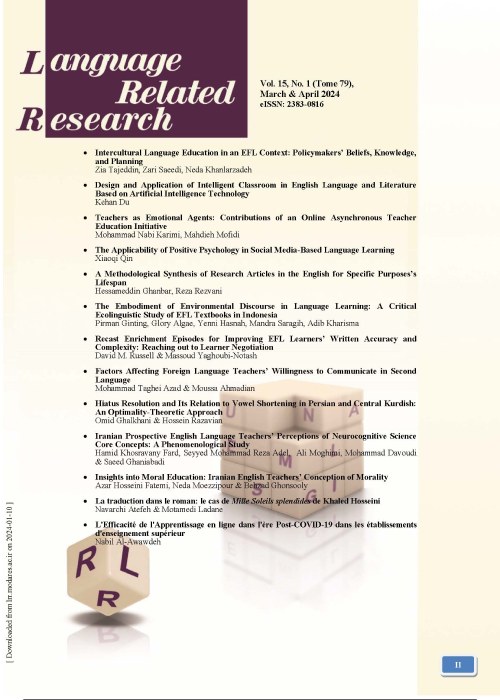The Study of Language and Style in Sam Shepard’s Fool for Love
This article aims to investigate the language of ‘May’ and has presented a stylistic study of Shepard’s Fool for Love (1983). To do the study, the writers of this article have benefited from ‘Level of the Word’, ‘Level of the Phrase/Sentence’ and ‘Level of Discourse’ presented by Sara mills. Using Mills’ ideas, the problem suggested in this article is to show whether ‘May’ is a powerful character or not. The purpose of this article is to compare and contrast the character of ‘May’ with the male characters of the play, and answer the following: Is she always obeying male characters of the play? And according to critics, has Shepard presented a weak female character in the play? The findings of the study show that ‘May’ has a submissive character and cannot affect others around her. She is also weaker than the male characters of the play.
Mills (1995) identifies three levels of analysis, the first of which is analysis at the level of the word (p. 62); at this level she identifies various methods that sexism is found in language, and they are as follows:Linguistic Determinism Generic Pronouns Generic Nouns Women as the Marked Form (pp. 62-70) Mills (1995) then goes on to discuss “Sexism and Meaning”, raising questions about the way in which meanings may be sex-specific; she discusses some problematic areas, namely:Naming and Androcentrism The Semantic Derogation of Women Endearments and Diminutives Female Experience: Euphemism and Taboo Lexical Gaps: Male Point of View Dictionaries and Gatekeepers (pp. 77-94) The second level of analysis which Mills (1995) proposes is analysis at the level of the phrase/sentence; she expands by suggesting areas that require particular attention in an analysis, said areas being:Ready-made Phrases Presupposition and Inference Metaphor Jokes and Humour Transitivity Choices (pp. 98-110) Regarding transitivity, Mills (1995) states that it has to do with the “representation of who acts (who is an agent) and who is acted upon (who is affected by the actions of others)”; she goes on to explain that there are three types of choices: “material, mental and relational” (p. 110). Mills (1995) elaborates further:In this system, processes can be categorized into those elements which are actions which can be observed in the real world and which have consequences (material), for example, ‘She swam across the river’; those which take place largely in the mind (mental), for example, ‘She thought about the situation’; and those which simply relate two elements together (relational), for example, ‘It is rather cold’. Within material action processes, there are two further choices, between ‘material action intention’ and ‘material action supervention’: with material action intention, there is a clear will to do something, for example, ‘I broke the window, in order to get into the house’; but with supervention, there is an attempt to capture for analysis those verbal processes where things are not done intentionally, for example, ‘I broke my favourite glasses’. (pp. 110-111) As has become clear, transitivity allows for investigation into whether a character is active or passive, and also whether a character manages to have an effect on her surroundings and other characters.The final level of analysis Mills (1995) observes is the level of discourse; she indicates a few areas for analysis at this level which consist of:Characters/Roles Fragmentation Focalization Schemata (pp. 123-148).
From the very beginning of the play, Eddie is shown as the active character while May remains the passive one. Also, inferences were made that May cannot provide for herself, coupled with the fact that May is the goal of Eddie’s material-action-intention act, shows that May is the powerless passive goal whereas Eddie is the powerful active agent. Even when May makes Eddie the goal of her act, Eddie is simultaneously doing the same, and the difference is that May is physically subordinated as well. In excerpt 2, Eddie’s belief that May needs someone to check up on her, suggests that May cannot take care of herself, and as such she is viewed as powerless and inferior. The aforementioned presupposition is indicative of an anti-feminist viewpoint in the play. Eddie proceeds by using a material-action-intention act whereas May uses an internal mental process, and said processes point to Eddie being powerful and active while May is powerless and passive.Excerpt 3 begins with Eddie using a “ready-made phrase” to indicate that because May has aged, she should not be dating, and this is a negative view designed to damage May’s perception of herself to make her believe she is not attractive. Eddie goes on to threaten May with material-action-intention acts, which show May’s subordination and powerlessness. Therefore, the exchanges between Eddie and May are dominated by the former, and this suggests the subordination of femininity. In the fourth excerpt, May uses a relational process which suggests that she is a passive character; the fact that said relational process is used to hide her date from Eddie, further supports her passivity and powerlessness. May’s identity is also brought into question because she does not influence Eddie, and simply reacts to his words and action not being able to instigate anything
- حق عضویت دریافتی صرف حمایت از نشریات عضو و نگهداری، تکمیل و توسعه مگیران میشود.
- پرداخت حق اشتراک و دانلود مقالات اجازه بازنشر آن در سایر رسانههای چاپی و دیجیتال را به کاربر نمیدهد.


